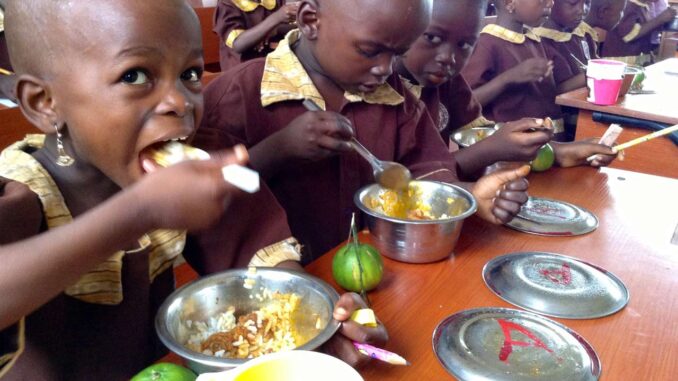
Professionals and other stakeholders have called on the Federal Government, states and local government authorities to take drastic steps to minimise rising protein deficiency, which is a major factor in malnutrition, stunting and wasting of under-five children and women.
Protein is one of the essential macronutrients, and they refer to foods that the body needs in large amounts. The other two major macronutrients are carbohydrates and fat. Together with micronutrients (vitamins and minerals), they make balanced diets if taken in moderate proportions. But millions of Nigerians, as a result of extreme poverty, are suffering from protein deficiency, in particular, and prominent micro-nutrients, like Vitamins A.
Action Against Hunger, an international body monitoring hunger, poverty and malnutrition, has disclosed that despite Nigeria’s abundant natural resources, more than half of the country lives below the poverty line, with malnutrition.
The northern Nigeria, it said in a report, “suffers the world’s third highest level of chronic undernutrition among children. This silent crisis is caused by lack of access to safe water and sanitation, rising food insecurity, the disruption of basic services due to conflict, and poor knowledge of healthy feeding practices for infants and young children.”
It said more than one million under-five children are acutely malnourished across the affected areas. One in five children with severe acute malnutrition and one in 15 children with moderate acute malnutrition are at risk of death if untreated.
Being dependent on a diet of staple foodstuffs that lack protein will undoubtedly result in protein deficiency. Protein deficiency is the significant absence of protein in the body. It affects all ages and cuts across all demographics. And this has become a serious challenge in Nigeria.
Highlights of another report by the Nigeria Protein Deficiency Awareness Campaign indicate that carbohydrates are the most consumed food among Nigerians.
Rice topped the list with 91 per cent, closely followed by ‘swallows’ such as eba, pounded yam, tuwo, amala, etc. at 83 per cent. 58 per cent of sampled institutional providers (dieticians and nutritionists) insisted that the protein intake of Nigerians is insufficient.
The nationwide survey indicated that 51 per cent of respondents did not consume adequate protein-rich foods due to high cost. Some staples consumed in Nigeria like bread, cassava, yam tubers, millet, sorghum, maize (corn) lack adequate protein.
The report showed that fundamental factors determining the necessity of meal items are availability (79%) and affordability (68%).
Ways forward
Fortunately, there are ways to resolve this challenge. Proteins are made up of millions of smaller units called amino acids attached in long chains. Amino acids are the building blocks of proteins. They play very important roles in the body, including improving metabolism and enabling detoxification. They are necessary for tissue growth and the absorption of essential vitamins and minerals.
A medical doctor, Dr Olalere Olajide, said attributed the high rate of protein deficiency to lack of knowledge of various sources of protein that are readily available and relatively higher cost than carbohydrates like yam, corns and maize, etc.
“The government, through health ministries, should increase awareness on various sources of protein available and affordable to the people. Agric ministries should also pay attention to growing of protein sources such as soya beans, beans and animal production,” Olajide advised.
It has also been suggested that the Federal Government, following the identification of the zones where protein deficiency is most prevalent, should coordinate efforts to provide immediate aid to the citizens in need of treatment, done in agreement with the state governments.
Secondly, eating right is a way to curb protein deficiency issues. However, this takes practice. If an individual just attempts to rapidly change what they eat overnight, the truth is, they might fail. This must be done gradually. Health experts advise that switching to a healthy diet is a gradual process. For example, if one eats eba or bread regularly, it won’t be easy to suddenly stop eating these meals and switch to a balanced diet.
People need to understand that it is more valuable to eat protein rich meals like beans, soy, eggs, dairy, etc., as Dr Olajide said, even on a low income. The focus should always be on the nutritional value.
The government again has a vital role to play. It can start by implementing policies to expand the economy, reduce unemployment, and moderate the overall price of healthy foodstuffs. It should give farmers more access to funding to ensure that their crops are of the highest quality.
Besides, it must promote and support efforts to make nutritious foods more affordable and available for the masses. This cater to the poor who cannot meet the expenses of some food items.
The media organisations are urged to be actively involved for with awareness comes knowledge, and with this comes the incentive to eat right.
This would draw public attention to the challenge, and educate Nigerians on the benefits and imperatives of consuming protein-rich diets.
Supporting the view above, Dr Olapeju Phorbee, of Food Agriculture Nutrition Network, Nigeria, said to minimize the challenge, “nutrition education is required by educating people to eat protein-rich foods like beans, fish, eggs, milk, beef, chicken, soybean products, etc.”
She advised all should work on availability and accessibility of protein-rich foods, for protein-rich foods are expensive and people, especially, mothers do complain of not being affordable. “They should be enlightened on the dangers of protein deficiency,” she said.
Phorbee said, “One of the ways to address this is to encourage home gardens. Encourage them to plant crops, rear chickens and goats, and eat within their households, sell the rest and use the proceeds to buy protein and micronutrient-rich foods. This is good, but then, we face the challenge of people selling all the produce and diverting the proceed to other needs, aside food.”
School feeding programmes, she advised, should get to all school children.
END

Be the first to comment